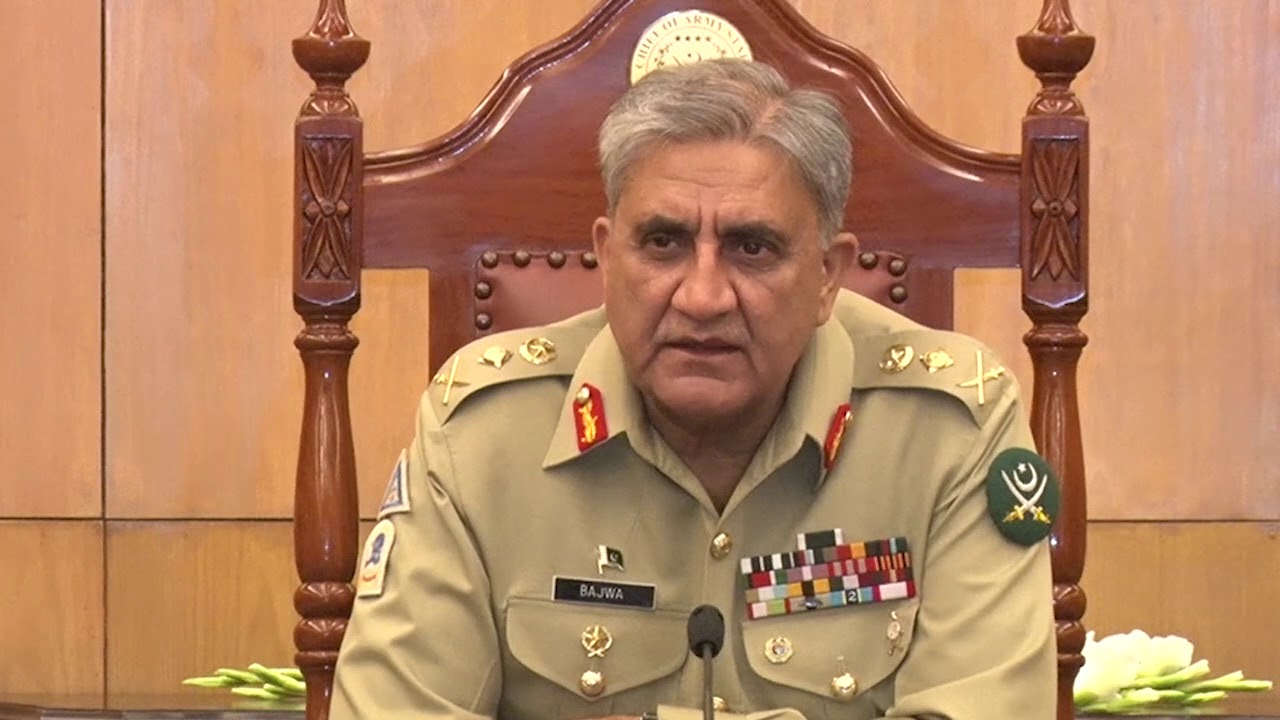High-level diplomatic signaling by a top general seems incongruous, even in Pakistan. Gen Qamar Bajwa’s posturing for peace with India, therefore, drew mixed responses. But realpolitik has its own exigencies, not always compatible with the sensibilities of political correctness. What some have seen as a gaffe may well be a diplomatic masterstroke delivered by a seasoned exponent of the art.
It all began on 25 February 2021, when the Director Gen Military Operations of Pakistan and India met on the hotline between the army headquarters of two armies. After reviewing the situation on the Line of Control (LoC) in Kashmir, the two sides announced a ceasefire between the land forces of two countries which are standing eyeball to eyeball in the disputed territory of Kashmir.
Before this ceasefire agreement the exchange of fire between the two armies had become a norm across more than 700 km of Line of Control (LoC) in Kashmir.
“In the interest of achieving mutually beneficial and sustainable peace along the borders, the two Directors Gen of Military Operations (DGMOs) agreed to address each other’s core issues and concerns which have a propensity to disturb the peace and lead to violence,” a joint statement said, referring to the military operations heads of the two countries.
According to the Inter-Services Public Relations (ISPR), the DGMOs of the two countries held discussions over the established mechanism of hotline contact. The two sides reviewed the situation along the Line of Control (LoC) and all other sectors in a free, frank, and cordial atmosphere. They reiterated that existing mechanisms of hotline contact and border flag meetings will be utilized to resolve any unforeseen situation or misunderstanding.
This agreement is apparently a good omen for future Pak-India relations but there is a problem: Pakistan-India relations seems to have been downgraded from the level of high-level diplomatic world of Prime Ministers, Foreign Ministers, and foreign secretaries to the level of senior military officials.
This may not seem problematic in Pakistan where it is customary for military officials to be more powerful than the political leadership. But this clearly is not the case in India, where military officials do not enjoy such a high status in the power structure of the country. The military officials in India occupy much lower ranks in the power hierarchy of the country.
This, in other words, would mean that India has handed over its Pakistan policy to lower echelons of the power hierarchy.
Ironically this development may add another feather to the cap of our own military leaders but this would mean downgrading the importance of Pakistan and its political system in the diplomatic and security world of this region.
In diplomatic terms this would mean that neither Prime Minister of India nor foreign Minister of India considered it up to their status to pick up the phone and talk directly to the Prime Minister or foreign minister of Pakistan to bring down the military tensions in Kashmir. They relegated the task to their uniformed minions.
Someone can put forward an argument that the ceasefire on the Line of Control is a technical military matter and has to be dealt with at the concerned military officials’ level. The valid argument to the extent that military technicalities have to be dealt with at the military officials’ level in the context of Pakistan and India, but reaching a ceasefire agreement between two countries that are political and military rivals is purely political and diplomatic decision.
In the past ceasefires between Pakistan and India had always been decided at the political level and military technicalities were dealt with at the military officials’ level only after a political and diplomatic decision had been made at the appropriate level.
This time, however, the current accord seems to have come without any participation from political leadership from either side – although the optics for the two capitals were in stark contrast. In New Delhi, Prime Minister Narendra Modi appeared very much in command, delegating a task to his military aides and receiving their report; in Islamabad, it was quite another story.
Perhaps we could keep up the appearances of Prime Minister Imran Khan delegating a task to his military aides and receiving their report – but for a public relations coup by the military leadership.
First, the new of a two-star Gen reaching a ceasefire agreement with his Indian counterpart pushed our Foreign Office in the background at least as far as public imagination is concerned. Then, less than a month later, Pakistan’s Chief of the Army Staff, Gen Qamar Javed Bajwa delivered a speech in a security seminar in Islamabad, which by all means could be construed as a policy statement as far as relations with India are concerned.
Again Prime Minister Imran Khan and our foreign ministry are nowhere visible as far as public imagination is concerned—it was a military official who reached a ceasefire agreement and it was COAS who laiddown an India policy for the Pakistan government.
“Stable Indo-Pak relation is a key to unlock the untapped potential of South and Central Asia by ensuring connectivity between East and West Asia”, Gen. Bajwa said addressing the security dialogue in Islamabad. “This potential, however, has forever remained hostage to disputes and issues between two nuclear neighbors. …
“It is important to understand that without the resolution of the Kashmir dispute through peaceful means, the process of subcontinental rapprochement will always remain susceptible to derailment due to politically motivated bellicosity. However, we feel that it is time to bury the past and move forward.”
This was not for the first time that Gen Bajwa has offered an olive branch to India, “It is our sincere belief that the route to peaceful resolution of Pak-India disputes – including the core issue of Kashmir – runs through comprehensive and meaningful dialogue,” he said while addressing the passing out parade of Pakistan Military Academy (PMA) cadets at Kakul in April 2018.
Gen Bajwa’s speech, though, was not an example of a simple one-way message. It contained all the elements of Pakistani diplomatic jargon aimed at convincing the world and the domestic audience that the Pakistani state believes in peace, “while at the same time it remained adamantly committed to its claimed status of equality with India”.
The COAS talked about a peace dialogue “with sovereign equality, dignity and honor”, adding Kashmir as a precondition for a comprehensive dialogue process. Similarly, in his latest speech, Gen Bajwa again stressed the need for India to create a conducive environment in Kashmir for the Pak-India peace process to resume.
The army chief’s statement on India did not come out of the blue. It was preceded by a major flurry of activity by senior army officials aimed at publicly projecting that the Pakistani army was not opposed to the idea of peace with India. Regular ceasefire violations along the Line of Control (LoC) in Kashmir followed a proposal from the military’s Gen Headquarters that Pakistani and Indian director generals of military operations should meet face to face in an effort to reduce tensions.
Similarly, a senior army official posted in Balochistan, where India’s Research and Analysis Wing is accused of fomenting trouble, offered India to join the China-Pakistan Economic Corridor along with other regional countries.
In the past 15 years, some fluctuations in the army’s attitude towards India seem to be personality-driven. But on closer inspection, military analysts say, the variation is because of the changing situation on our western border. During the time of Gen Ashfaq Parvez Kayani, the army told the government, led by Pakistan People’s Party (PPP), that talks with India were a necessity in order to avoid a major conflict on our border.
“Gen Kayani was telling the PPP leadership that keep talking with India as the army does not want a major conflict … but don’t get too close with India,” a senior Foreign Office official who is now retired once told me.
This was in complete contrast with the army’s policy during the tenure of Gen Raheel Sharif. The situation on the LoC remained tense and political analysts say the army employed its manipulative tools to keep Nawaz Sharif away from the idea of normalizing ties with India. The two Pakistan Tehreek-e-Insaf-led agitations were also seen in that light.
So why did Gen Bajwa give a full-fledged policy statement expressing the army’s willingness to normalize relations with India? If Pakistan’s domestic political situation is any indication, the army chief is the most prominent center of power, and the army the only institution that has the standing to issue a policy statement to the world.
Besides, Pakistani military establishment is sponsoring a peace process in Afghanistan between the Taliban and the Afghan government. The Pakistani army has wholeheartedly embraced a mega-regional connectivity project which in Pakistan goes by the name of the China-Pakistan Economic Corridor (CPEC). In such a situation it would be an anomaly of the highest order to continue military antagonism.
The world must be in no doubt that Islamabad understands the necessity to make peace with India in the interest of regional peace and prosperity – which after all is in Pakistan’s interest.










